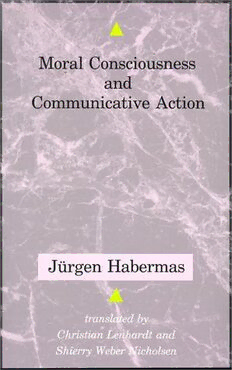
Moral Consciousness and Communicative Action PDF
261 Pages·1990·1.955 MB·English
Most books are stored in the elastic cloud where traffic is expensive. For this reason, we have a limit on daily download.
Preview Moral Consciousness and Communicative Action
Description:
This long-awaited book sets out the implications of Habermas's theory of communicative action for moral theory. "Discourse ethics" attempts to reconstruct a moral point of view from which normative claims can be impartially judged. The theory of justice it develops replaces Kant's categorical imperative with a procedure of justification based on reasoned agreement among participants in practical discourse.Habermas connects communicative ethics to the theory of social action via an examination of research in the social psychology of moral and interpersonal development. He aims to show that our basic moral intuitions spring from something deeper and more universal than contingent features of our tradition, namely from normative presuppositions of social interaction that belong to the repertoire of competent agents in any society. Jürgen Habermas is Professor of Philosophy at the University of Frankfurt.
See more
The list of books you might like
Most books are stored in the elastic cloud where traffic is expensive. For this reason, we have a limit on daily download.
